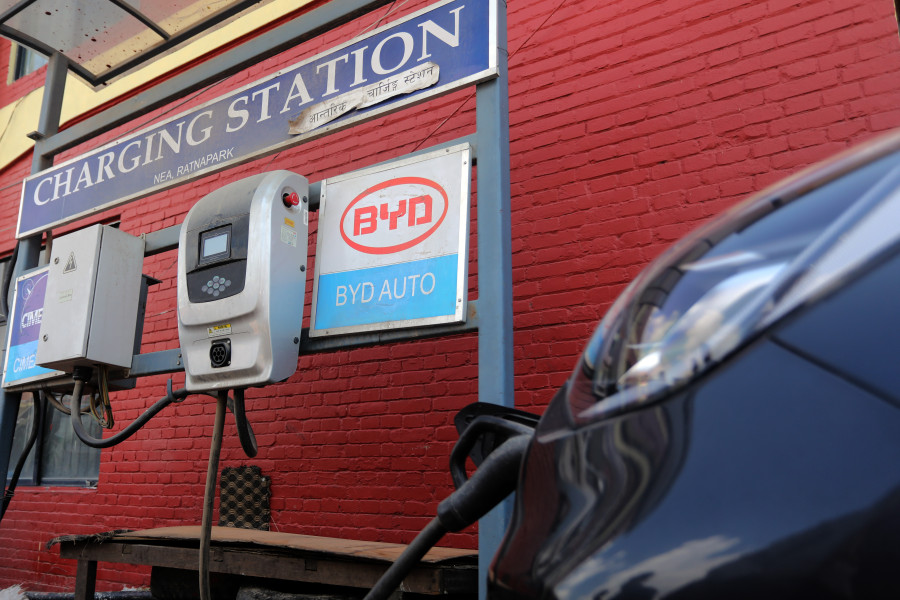Money
Energy Ministry clears the way for investors to open charging stations
Service providers may be allowed to add a markup of up to 20 percent as service charge.
Prahlad Rijal
Amid growing concerns over lack of charging infrastructure deterring the growth of electric mobility in the country, the Energy Ministry has outlined a business model paving the way for private investment in building charging stations for commercial operation.
“The outline which, once incorporated by the Nepal Electricity Authority in a concrete technical and financial work procedure, will guide many commercial entities to build and profit from charging stations,” said Prabin Raj Aryal, spokesperson for the Energy Ministry.
“It is up to the power utility to come up with standards which will govern commercialisation of the infrastructure.”
As per the outline, service providers will be allowed to set up charging points at public spheres, government offices, public entities and businesses, and commercial and residential buildings.
“Hoteliers and restaurant owners can also build the facility at their premises, and electric vehicle producers or distributors can also build charging stations dedicated to serving their consumer segment," states the outline.
The ministry's move comes just four months before the 2020 deadline set by the government to convert 20 percent of the transport fleet into electric as compared to the 2010 level.
Despite action plans, the country is yet to see a sizeable mass of people switching from gas guzzlers to electric vehicles.
According to the government’s National Plan for Electric Mobility, lack of charging infrastructure is one of the main reasons that could discourage consumers from switching to electric vehicles, and potential charging station operators too may not invest in them unless there is a sizeable mass of electric cars on the roads.
The situation is expected to change in line with the development of a business model ensuring commercial operation of the infrastructure by private entities.
In its outline, the Energy Ministry has recommended allowing authorised service providers to take up to 20 percent more as service charge from electric vehicle owners apart from the standard electricity tariff.
As the Electricity Regulatory Commission is yet to come up with tariffs for selling power through charging stations, the ministry has suggested that the Nepal Electricity Authority take current electricity surcharges collected under the heading ‘other transportation sector’ by the power utility.
The sector pays Rs4 per unit during nighttime, Rs8 per unit in the afternoon and Rs9 unit during peak hours.
Businesses or persons building charging stations can collect 15 to 20 percent in service charges from electric vehicle owners, depending on the nature of such stations.
A service provider who has installed a slow charging station can take only 15 percent as service charge while a level 4—fastest charging point—operator can collect 20 percent as service charge from consumers.
Also, general consumers of the Nepal Electricity Authority can get permits for installing charging ports for private vehicles at their residences by paying the usual electricity tariff currently imposed on household consumption.
“The charging infrastructure will help to utilise surplus power during nighttime,” said Kulman Ghising, managing director of the Nepal Electricity Authority. “A draft on parameters of safety, testing and operation of charging stations throughout the country is ready, and it will be tabled at the electricity authority’s board meeting for approval soon.”
The persons or institutions that plan to invest in charging infrastructure must obtain a permit from the Nepal Electricity Authority while no licences will be required for setting up a household charging system unless the household consumption goes beyond an approved load level.
As the ministry has designated the power utility as the regulatory authority for charging infrastructure, all charging service providers are required to follow the parameters set by the electricity authority while designing, installing and commissioning the facility.
“The developers must test and commission the facility in the presence of a technical officer of the electricity authority and obtain a test certificate before beginning commercial operation,” states the outline.
The developers will also be allowed to build solar grids to power the station.




 21.12°C Kathmandu
21.12°C Kathmandu














